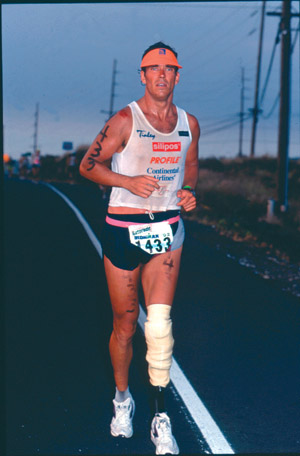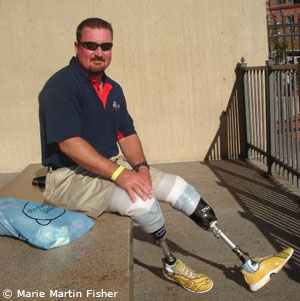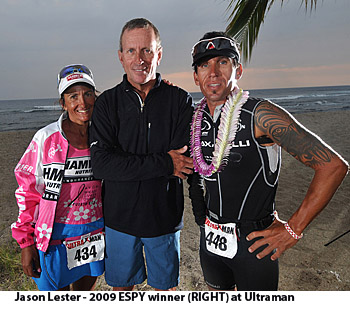The shining courage of Jim MacLaren

How many of us could be twice cursed in life so cruelly, so painfully – and find the strength of spirit to transcend those physical devastations and call them a gift?
Who among us could not merely cling to simple survival after accidents which cost him a leg and then, for a while, the feeling and the mobility in all four limbs – but then rouse the charisma and heart to achieve a miraculous level of recovery and reach out to inspire and help countless others?
Jim MacLaren died August 30 at age 47 a man who had an incredible impact in his too-short life.
At age 21, he was an incredibly handsome specimen – an All-American defensive tackle who stood 6-feet 5-inches and weighed a chiseled 300 pounds — who was also a gifted actor at the prestigious Yale School of Drama. The next year, in October 1985, he was riding his motorcycle in New York City and got hit by a 40,000 pound bus. When he woke up, his left lower leg was gone but somehow he mustered the will to not only recover but to prevail. He sculpted his powerful body to the lean dimensions of the endurance athlete and set records of 3:16 in the marathon and 10:42 at the Ironman.
The saying goes that the fates, or God, or whatever you might call the power that orders the universe does not ask more of any of us than we can bear. Which by definition makes Jim MacLaren a serious cut above your average everyday hero.
In June of 1993, MacLaren was sitting at home in Boulder, Colorado reading a book about spirituality. While gazing at the nearby Flatirons in the foothills of the Rockies, he had what he told the New Haven Register was an epiphany. “I thought ‘It's seven years later and I’ve reinvented my life. I’m using my philosophies in motivational speaking. I’m the fastest man in the world on one leg. And I’m only competing against able-bodied athletes.’ And I started crying.”
When his training partner came out and asked what was wrong, he recalled to the New Haven Register writer, “Something amazing is about to happen. I can just feel it.”
A day later, In June of 1993, while competing in the Orange County Performing Arts Triathlon in Mission Viejo, California, a black van crossed into the bike course and hit MacLaren.
Before that moment, recalled MacLaren in a moving short movie directed by Emmy-winning director Lisa Lax, “I thought “Wow. I’m back in it. I’m back in life.”
The van hit MacLaren’s back wheel and he was thrown from his bicycle headfirst into signpost and broke his neck. “At the hospital, the doctor said 'You are a quadriplegic. And you’re never going to move or feel from the chest down for the rest of your life.”

The doctors who pronounced that diagnosis did not count on the great heart and indomitable will of the man. Plunging into rehab with ferocity at Englewood Colorado’s spinal cord injury center, MacLaren one day found his leg moved almost imperceptibly. Then he got some sensation in his hip. Then a finger. Every door to feeling and movement that opened was also filled with searing, exhausting pain.
Within a year, he was home and had enough motor control to achieve a serious degree of independence and could resume his thriving career as a motivational speaker. Then, despite his superhuman fight against paralysis and miraculous recovery, he found he was still only a human fighting pain and faced yet another challenge – cocaine addiction.
Thanks to a dedicated therapist who convinced him to seek help, he entered another form of rehab and broke the habit. MacLaren told the New Haven Register, “I chose life and to engage people to keep trying to find new levels of integrity within myself.”
A few years later, MacLaren made a speech at the awards ceremony at Kona after the Ironman. A screen set up on stage showed him struggling in therapy to walk and to swim and to ride a stationary bike. When he told the audience that once again he could swim and ride and walk – and now he was once again a triathlete – the audience cried a river and exploded with cheers.
He will be missed by so many men and women, triathletes and runners and physically challenged athletes aplenty. But his lasting legacy might best be seen in the Challenged Athletes Foundation. When he was facing mounting medical bills and the hard reality of building a life again after the Orange County crash,
Bob Babbitt, Jeffrey Essakow and Rick Kozlowski, three of his many friends from the sport of triathlon, created a triathlon in San Diego after the accident to buy Jim a vehicle that he could drive with his hands. The goal was to raise $25,000 and they ended up raising $48,000 through the first ever San Diego Triathlon Challenge.
Seventeen years later, the CAF has raised $28 million for a growing army of physically challenged athletes who have been offered the latest in prosthetic limbs, sports equipment and much needed support to help them launch second careers in sport.
It was the Challenged Athletes Foundation that gave a Ghanaian amputee Emmanuel Ofosu Yeboah the money to buy a mountain bike and CAF donations that got him an artificial limb that set him on an inspiring career as an athlete who fought his country’s prejudice against physically challenged children. In 2005, MacLaren and Yeboah were awarded the Arthur Ashe Courage Award at the ESPYs.
In the moving documentary, Jim MacLaren told Lisa Lax “I found my strength by saying and believing I am not my body. I am a man. I’m alive. As alive as anybody who is jamming a basketball or scoring a touchdown or hugging a child. Being alive is being alive. It's a good thing.”
As MacLaren’s courage was projected on big screens and seen by millions who felt better just by hearing his story, it is instructive to remember that Jim MacLaren’s suffering didn’t end bathed in applause at the ESPYs or with the cheers ringing in his ears at the Kona awards. As one triathlon writer congratulated him upon his moving speech at Kona, MacLaren’s always-handsome face was twisted in pain, a pain he felt every day in his life.
It is important to remember that it was a miracle that Jim MacLaren found the strength to emerge from the unrelenting ring of fiery pain that encircled him every day.
Photographs of Jim MacLaren by Tim Mantoani (top) and Lois Schwartz (bottom) provided by Challenged Athletes Foundation co-founder Bob Babbitt.



